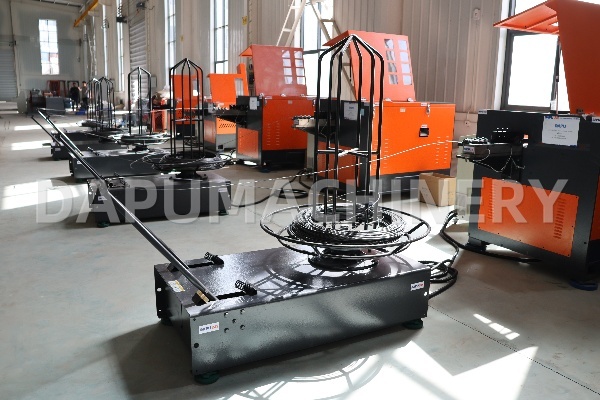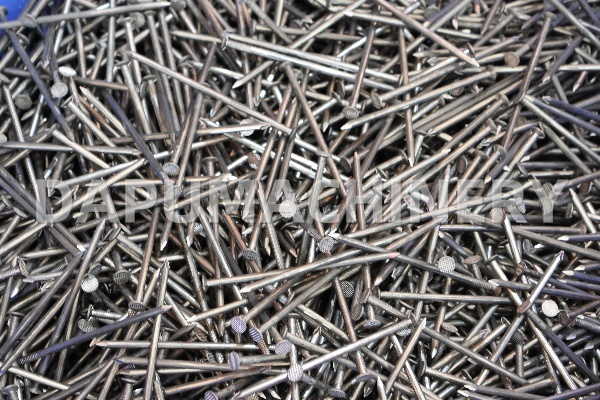
Why Nail Making Machines Are in High Demand in Africa, Latin America, and Southeast Asia
Category:News
Author:
Source:
Add time:2025-05-07 11:55
The construction industry in Africa, Latin America, and Southeast Asia is undergoing a transformative boom. Rapid urbanization, infrastructure development, and a growing middle class are driving unprecedented demand for affordable building materials—especially nails. However, relying on imported nails is costly and unsustainable for these regions. Instead, local manufacturers are turning to nail making machines to produce nails domestically, reduce costs, and meet market needs.


But why are these machines in such high demand? Let’s explore the unique economic, geographic, and industrial factors shaping this trend—and how the DAPU Nail Making Machine (Model Link) is helping businesses capitalize on the opportunity.
1. Rapid Urbanization and Housing Shortages
The Problem:
Africa, Latin America, and Southeast Asia are urbanizing faster than any other regions globally. For example:
Africa: Over 40% of the population will live in cities by 2030, requiring 4 million new housing units annually.
Southeast Asia: Countries like Indonesia and Vietnam need 10 million new homes by 2025.
Latin America: Informal settlements in Brazil and Colombia lack access to quality construction materials.
Traditional hand-made nails can’t meet this demand, creating bottlenecks in housing projects.
The Solution:
Nail making machines enable mass production at speeds of 200–400 nails per minute, ensuring a steady supply for builders. The DAPU Automatic Nail Making Machine, for instance, produces nails in sizes from 10mm to 150mm, catering to everything from furniture to roofing.
2. Infrastructure Development Projects
The Problem:
Governments and private investors are pouring funds into roads, bridges, and utilities:
Africa: The African Union’s Agenda 2063 prioritizes continental infrastructure integration.
Latin America: Chile and Peru are expanding ports and highways to boost trade.
Southeast Asia: Thailand and Malaysia are building smart cities and industrial zones.
These projects require millions of nails for concrete forms, scaffolding, and structural joints.
The Solution:
High-speed nail machines like DAPU’s model produce 8–12 tons of nails monthly, making them ideal for contractors bidding on large-scale projects. Its compatibility with low-carbon and recycled steel also aligns with sustainable construction trends.
3. High Costs of Imported Nails
The Problem:
Importing nails is expensive due to:
Shipping Fees: Rising fuel costs inflate prices, especially for landlocked African nations.
Tariffs: Brazil and Nigeria impose heavy duties on foreign construction materials.
Currency Fluctuations: Volatile exchange rates in countries like Argentina or Zimbabwe make imports unpredictable.
Local manufacturers can undercut imported nail prices by 30–50%, but only with efficient machinery.
The Solution:
The DAPU Nail Making Machine offers a 2–3 year payback period, allowing startups to produce nails at 1.00 per kg (vs. 2.50 for imports). Its low energy consumption (7.5 kW) further reduces operating costs.
4. Harsh Environmental Conditions
The Problem:
Climate and geography pose unique challenges:
Africa: Coastal regions (e.g., Ghana, Kenya) face saltwater corrosion, while deserts (e.g., Sudan) battle dust.
Latin America: Humidity in Amazonian countries rusts low-quality nails.
Southeast Asia: Monsoon rains degrade unprotected metal.
Cheap imported nails often fail prematurely, damaging builders’ reputations.
The Solution:
The DAPU machine supports galvanized or coated nail production, extending product lifespan in harsh climates. Its stainless steel components and dust-proof design also ensure the machine itself survives tough environments.
5. Energy and Technical Limitations
The Problem:
Many regions lack stable electricity or skilled technicians:
Africa: Only 48% of sub-Saharan Africa has grid access.
Southeast Asia: Remote Indonesian islands rely on generators.
Latin America: Power outages plague Venezuelan and Haitian factories.
Complex, high-power machines often stall in these conditions.
The Solution:
DAPU’s machine is designed for low-voltage operation and compatibility with solar power or generators. Its automated, user-friendly interface requires minimal training—a key advantage in areas with scarce technical expertise.
Case Study: Boosting Local Production in Kenya
A Nairobi-based startup purchased a DAPU machine to supply roofing nails for rural housing projects. Despite Kenya’s frequent blackouts, they powered the machine with solar panels and achieved:
Output: 5 tons of nails monthly.
Cost Savings: 40% lower than Chinese imports.
Job Creation: Hired and trained 10 local workers.
Within a year, they became a trusted supplier for 20+ hardware stores across East Africa.
How the DAPU Machine Meets Regional Needs
| Feature | Africa | Latin America | Southeast Asia |
|---|---|---|---|
| Power Adaptability | Solar/generator compatible | Stable in low-voltage grids | Generator-friendly for islands |
| Material Flexibility | Uses recycled steel | Compatible with local alloys | Accepts varying wire sizes |
| Durability | Rust-resistant coating | Humidity-proof design | Monsoon-resistant motors |
| Affordability | Low ROI timeline (6–12 mo) | Avoids import tariffs | Reduces reliance on China |
Future Trends Driving Demand
Government Incentives: Nigeria and Indonesia now subsidize local manufacturing equipment.
Rise of DIY Culture: Urban homeowners in Mexico and Thailand buy nails for small renovations.
Export Opportunities: Ghanaian and Vietnamese manufacturers are tapping regional markets.
Choosing the Right Machine for Your Market
When selecting a nail making machine, prioritize:
Speed vs. Cost Balance: High output doesn’t justify high energy bills.
After-Sales Support: Ensure spare parts are available locally.
Customization: Can the machine produce nails popular in your area (e.g., corrugated roofing nails in Africa)?
The DAPU Automatic Nail Making Machine excels in all three areas, offering:
200–400 nails/minute production speed.
10mm–150mm nail length adjustability.
24/7 regional technical support via DAPU’s partner network.
Conclusion
Nail making machines are not just tools—they’re catalysts for economic growth in Africa, Latin America, and Southeast Asia. By enabling local production, they reduce costs, create jobs, and empower communities to build their own futures. The DAPU Nail Making Machine stands at the forefront of this movement, combining affordability, durability, and adaptability to overcome regional challenges.
Recommend News




